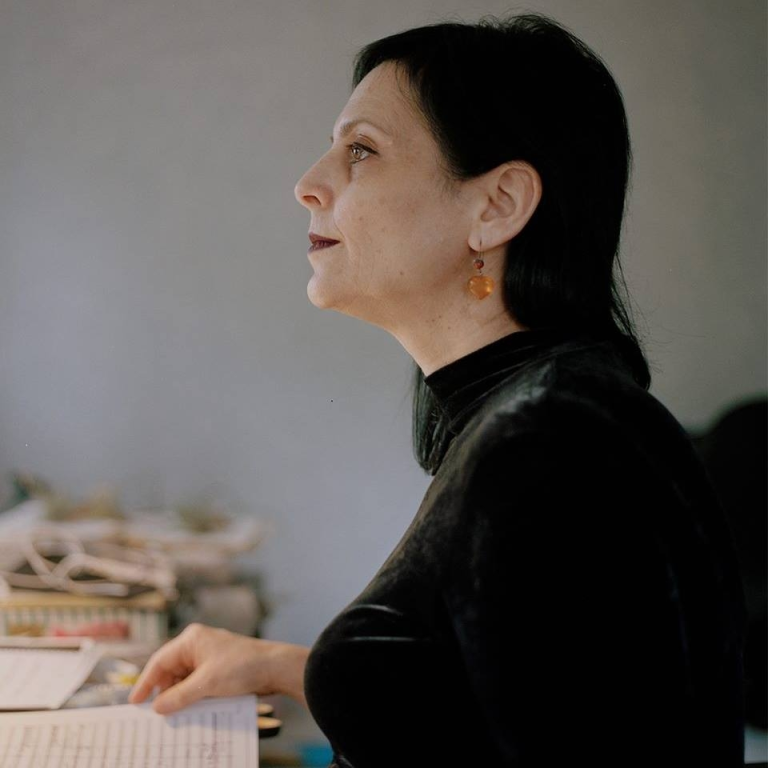Commissions & Premières
Chaya Czernowin was born and brought up in Israel. After her studies in Israel, at the age of 25, she continued studying in Germany on the DAAD grant and in the USA. She then lived in Tokyo on the Asahi Shimbun Scholarship and American National Endowment for the Arts grant, and in Germany on a Fellowship at the Akademie Schloss Solitude. Her music has been performed throughout the world by leading orchestras and performers of new music. She has held a professorship at the University of California San Diego, and was the first woman to be appointed as Professor of Composition at the University of Music and Performing Arts Vienna (2006–2009), and Harvard University (2009-present) where she has been the Walter Bigelow Rosen Professor of Music. Together with Steven Kazuo Takasugi and Jean-Baptiste Joly, she founded the Summer Academy at the Akademie Schloss Solitude, a biennial course for composers which ran from 2003-2019. Takasugi and Czernowin also taught at the Tzlil Meudcan Festival, based in Israel and founded by Yaron Deutsch of Ensemble Nikel.
Czernowin’s output includes chamber and orchestral music, with and without electronics, and her works have been played at most of the significant new music festivals. She has composed four large-scale works for the stage: Pnima…Ins Innere (2000, Munich Biennale), chosen as Best Premiere of the Year by the yearly critic survey of Opernwelt, and recipient of the prestigious Bayerischer Theaterpreis; Zaïde / Adama (2006, Salzburg Festival); Infinite Now (2017, commissioned by Opera Ballet Vlaanderen, IRCAM Paris and Nationaltheater Mannheim), again Opernwelt’s Best Premiere of the Year; and Heart Chamber (2018-2019, commissioned by the Deutsche Oper Berlin). Czernowin was appointed Artist in Residence at the Salzburg Festival in 2005-2006, Lucerne Festival in 2013 and Huddersfield Festival in 2021.
Characteristic of Czernowin’s work are working with metaphor as a means of reaching and analysing an unfamiliar sound world; the use of noise and physical parameters as weight and textural surface; an inquiry of the handling of time; and the shifting of scale and perspective. These ways of working and thinking fuse her work with multisensory content, and work to reach a sonic expression which includes the subconscious and goes beyond style, conventions or rationality.
In addition to numerous other prizes, Czernowin represented Israel at the UNESCO International Rostrum of Composers (1980), and was awarded the Stipendium Preis (1988) and Kranichsteiner Musikpreis (1992) at the Darmstädter Ferienkurse; IRCAM Reading Panel commission (1998); scholarships of the SWR Experimentalstudio (1998, 2000, 2001 and more); Composer Prize of the Ernst von Siemens Music Prize (2003); Rockefeller Foundation Award (2004); a nomination as Fellow of the Wissenschaftskolleg zu Berlin (2008); Fromm Music Foundation Award (2009); Guggenheim Fellowship (2011); Heidelberger Künstlerinnenpreis (2016); and Quarterly Critics’ Choice at the German Record Critics’ Award (2016). She was chosen as a member of the Akademie der Künste Berlin in 2017 and Bavarian Academy of Fine Arts in 2021. In 2022, she was awarded the GEMA German Music Authors’ Prize in the Music Theatre (New Opera) category.
Czernowin’s work is published by Schott. Her music is recorded on Mode records, Wergo, col legno, Deutsche Grammophon, KAIROS, NEOS Music, Ethos Records, Telos Music Records and Einstein Records. She lives near Boston with Steven Kazuo Takasugi, and is an Israeli-American citizen.
- Website: www.chayaczernowin.com
Moths of Hunger and Awe (2023/2024)
for Violin Solo & String Orchestra
Commissioned by Münchener Kammerorchester with the support of the Ernst von Siemens Music Stiftung, Musikkollegium Winterthur and Hong Kong Sinfonietta
13 SEP 2025 ASIAN PREMIÈRE

